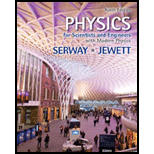
Concept explainers
(a)
Energy produced by the fission of
(a)
Answer to Problem 64AP
Energy produced by the fission of
Explanation of Solution
Write the equation to find the number of nuclie in the given mass.
Here,
Write the equation to find the total energy produced.
Here,
Conclusion:
Substitute
Substitute
Therefore, the energy produced by the fission of
(b)
Energy produced by the deuterium –tritium fusion reaction.
(b)
Answer to Problem 64AP
Energy produced by the deuterium –tritium fusion reaction is
Explanation of Solution
Write the equation to find the Energy produced by the deuterium –tritium fusion reaction.
Here,
Write the equation to find
Here,
Rewrite the expression for
Conclusion:
Substitute
Therefore, the energy produced by the deuterium –tritium fusion reaction is
(c)
Energy produced by the deuterium –tritium fusion reaction for
(c)
Answer to Problem 64AP
Energy produced by the deuterium –tritium fusion reaction for
Explanation of Solution
Write the equation to find the energy produced by the deuterium –tritium fusion reaction for given mass of deuterium.
Here,
Write the equation to find the number of nuclie in the given mass.
Here,
Rewrite equation (I) by substituting the above relation for
Conclusion:
Substitute
Therefore, the energy produced by the deuterium –tritium fusion reaction for
(d)
Energy produced by the combustion of
(d)
Answer to Problem 64AP
Energy produced by the combustion of
Explanation of Solution
Write the equation to find the energy produced by the deuterium –tritium fusion reaction for given mass of deuterium.
Here,
Write the equation to find the number of nuclie in the given mass.
Here,
Rewrite the equation for
Conclusion:
Substitute
Therefore, the energy produced by the combustion of
(e)
The pros and corns of energy production by fission, fusion, and combustion.
(e)
Explanation of Solution
To produce energy by combustion, coal is used. Coal is abundant form of fossil fuel and it is very cheap. The disadvantage is the high carbon emission and thereby acts as a major contributor in global warming. Energy production by nuclear fission cannot produce carbon and the working of reactor cannot cause any pollution. But the disposal of radioactive waste materials from the reactor is a very big challenge.
Nuclear fusion is better than fission since it does not produce radioactive by-products. But researches on nuclear fusion reactor are in developing stage only and it requires extreme high temperature for its working that cannot be achieved by man at present. Plutonium is a very risky material to handle in fission process.
Therefore, combustion is cheaper, but carbon emission is high, fission cannot cause global warming but produce radioactive bye products, and nuclear fusion cannot produce radioactive pollution but requires very large temperature that cannot be achieved in a laboratory at present.
Want to see more full solutions like this?
Chapter 45 Solutions
Physics for Scientists and Engineers With Modern Physics
- Hi Expert, I have uploaded picture, could you please name the Greek alphabet and their name in English?arrow_forwardHi Expert in Physics, I have uploaded pictures with respect to some physics equations. Could please name all Greek alphabet and their English name?arrow_forward81 SSM Figure 29-84 shows a cross section of an infinite conducting sheet carrying a current per unit x-length of 2; the current emerges perpendicularly out of the page. (a) Use the Biot-Savart law and symmetry to show that for all points B P P. BD P' Figure 29-84 Problem 81. x P above the sheet and all points P' below it, the magnetic field B is parallel to the sheet and directed as shown. (b) Use Ampere's law to prove that B = ½µλ at all points P and P'.arrow_forward
- What All equations of Ountum physics?arrow_forwardPlease rewrite the rules of Quantum mechanics?arrow_forwardSuppose there are two transformers between your house and the high-voltage transmission line that distributes the power. In addition, assume your house is the only one using electric power. At a substation the primary of a step-down transformer (turns ratio = 1:23) receives the voltage from the high-voltage transmission line. Because of your usage, a current of 51.1 mA exists in the primary of the transformer. The secondary is connected to the primary of another step-down transformer (turns ratio = 1:36) somewhere near your house, perhaps up on a telephone pole. The secondary of this transformer delivers a 240-V emf to your house. How much power is your house using? Remember that the current and voltage given in this problem are rms values.arrow_forward
- The human eye is most sensitive to light having a frequency of about 5.5 × 1014 Hz, which is in the yellow-green region of the electromagnetic spectrum. How many wavelengths of this light can fit across a distance of 2.2 cm?arrow_forwardA one-dimensional harmonic oscillator of mass m and angular frequency w is in a heat bath of temperature T. What is the root mean square of the displacement of the oscillator? (In the expressions below k is the Boltzmann constant.) Select one: ○ (KT/mw²)1/2 ○ (KT/mw²)-1/2 ○ kT/w O (KT/mw²) 1/2In(2)arrow_forwardTwo polarizers are placed on top of each other so that their transmission axes coincide. If unpolarized light falls on the system, the transmitted intensity is lo. What is the transmitted intensity if one of the polarizers is rotated by 30 degrees? Select one: ○ 10/4 ○ 0.866 lo ○ 310/4 01/2 10/2arrow_forward
- Before attempting this problem, review Conceptual Example 7. The intensity of the light that reaches the photocell in the drawing is 160 W/m², when 0 = 18°. What would be the intensity reaching the photocell if the analyzer were removed from the setup, everything else remaining the same? Light Photocell Polarizer Insert Analyzerarrow_forwardThe lifetime of a muon in its rest frame is 2.2 microseconds. What is the lifetime of the muon measured in the laboratory frame, where the muon's kinetic energy is 53 MeV? It is known that the rest energy of the muon is 106 MeV. Select one: O 4.4 microseconds O 6.6 microseconds O 3.3 microseconds O 1.1 microsecondsarrow_forwardThe Lagrangian of a particle performing harmonic oscil- lations is written in the form L = ax² - Bx² - yx, where a, and are constants. What is the angular frequency of oscillations? A) √2/a B) √(+2a)/B C) √√Ba D) B/αarrow_forward
 Modern PhysicsPhysicsISBN:9781111794378Author:Raymond A. Serway, Clement J. Moses, Curt A. MoyerPublisher:Cengage Learning
Modern PhysicsPhysicsISBN:9781111794378Author:Raymond A. Serway, Clement J. Moses, Curt A. MoyerPublisher:Cengage Learning Principles of Physics: A Calculus-Based TextPhysicsISBN:9781133104261Author:Raymond A. Serway, John W. JewettPublisher:Cengage Learning
Principles of Physics: A Calculus-Based TextPhysicsISBN:9781133104261Author:Raymond A. Serway, John W. JewettPublisher:Cengage Learning Physics for Scientists and Engineers with Modern ...PhysicsISBN:9781337553292Author:Raymond A. Serway, John W. JewettPublisher:Cengage Learning
Physics for Scientists and Engineers with Modern ...PhysicsISBN:9781337553292Author:Raymond A. Serway, John W. JewettPublisher:Cengage Learning University Physics Volume 3PhysicsISBN:9781938168185Author:William Moebs, Jeff SannyPublisher:OpenStax
University Physics Volume 3PhysicsISBN:9781938168185Author:William Moebs, Jeff SannyPublisher:OpenStax College PhysicsPhysicsISBN:9781938168000Author:Paul Peter Urone, Roger HinrichsPublisher:OpenStax College
College PhysicsPhysicsISBN:9781938168000Author:Paul Peter Urone, Roger HinrichsPublisher:OpenStax College Stars and GalaxiesPhysicsISBN:9781305120785Author:Michael A. Seeds, Dana BackmanPublisher:Cengage Learning
Stars and GalaxiesPhysicsISBN:9781305120785Author:Michael A. Seeds, Dana BackmanPublisher:Cengage Learning





